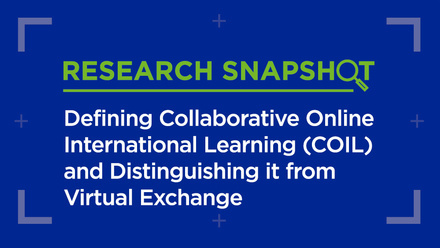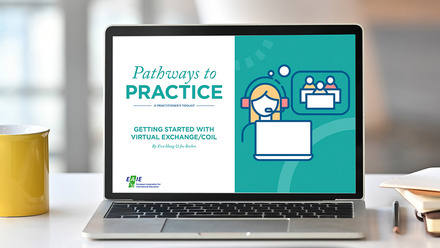5 lessons from going digital with short-term programmes

The COVID-19 pandemic has completely changed not only our lives and where we work but also our attitudes to change. Change can be difficult, especially when it is occurring rapidly and in a multitude of areas. The widespread introduction of digital education; the proliferation of online conferences, meetings, and webinars; students being forced to sit in front of their laptops; and uncertainty about the end of the pandemic are all factors that have encouraged us to explore new ways of doing things.
At the University of Pécs, one specific area in which we have been actively reconfiguring our approach to programme design and delivery as a result of the pandemic is that of short-cycle online programmes for students abroad.
Scanning the environment
To implement meaningful change, awareness of the current context is vital. Since March 2020, we have been learning and growing while exploring and testing out different online platforms and discovering the benefits of each system. We continue to study closely international students’ needs, expectations, and opportunities for virtual mobility, and we are incorporating an increasing number of short-term programmes into virtual online platforms. We are pleased to see an increasing number of international students applying for online programmes. We are also studying the international higher education market, as well as our partners and competitors. When we look back to the past year and a half, even we are surprised by what we achieved in such a short period of time, as we expanded our offer to students with a greatly increased number of online summer and winter universities, COIL projects, virtual internship programmes, and online training courses and workshops.
Focusing on engagement
One of the key lessons we have learned is that interactivity and creativity are central to all of our short-term programmes. Many students are eager to participate in online programmes if they are provided with experiences that demand and foster their active participation. Similar to face-to-face summer and winter university programmes that we offer, the main aim of our virtual short-term programmes is to build communities of participants, to provide a space for participants to make friends, and to make the programme a memorable intercultural experience. In order to achieve this objective, we need to turn the old tried and tested programmes on their head, using new methodologies and new organisational techniques.
One of the key lessons we have learned is that interactivity and creativity are central to all of our short-term programmes.
Innovating for impact
Here are the top five lessons we have learned from going digital with our short-cycle online programmes:
1. Tweaking programmes is not enough
The traditional way of developing programmes needs to be thoroughly changed. For example, they need to be redesigned to take into account time zone differences and we feel they should only be advertised to students from countries with similar time zones. The length and number of lessons should also be shortened to make the learning experience enjoyable for students and to ensure that the material flows – both in terms of the sequencing of content and its organisation into digestible parts. It is also very important to schedule regular breaks of sufficient length to ensure that participants are well rested before they sit down at their computers again. Community activities, which are also very important for summer and winter universities, are even more crucial in virtual programmes. They help bring people together to learn about each other's cultures, customs and music, and they require participants to cross borders and go on exciting virtual journeys together.
2. New pedagogical approaches are required
New programme elements (such as consultations and informal discussions) are needed to complement the learning sessions. Lecturers must therefore take on a new, mentoring role. Given the emphasis on interactivity in teaching, only those lecturers who are able and willing to deliver the curriculum in an innovative, interactive way, and who are open to new, online teaching methodologies to make lessons more dynamic and engaging, should be invited to facilitate virtual short-cycle programmes. Not all teachers are open to this type of pedagogy, so it is important to discuss expectations beforehand.
3. Student buy-in is vital
As with the lecturers, students should also be open to interactive lessons and community activities. Since synchronous online programmes are much more successful if students turn on their cameras, this requirement needs to be discussed with programme applicants in advance. They should be encouraged throughout the whole programme to actively participate in lessons and community programmes, and they should be reassured that their active presence is very important to make a virtual programme a truly enjoyable experience.
4. Technology choices matter
It is very important to choose a platform that allows interactivity and is easy to use. Lecturers should receive training and an IT specialist should be available throughout the programme to assist if problems arise. A preliminary test should be carried out with both teachers and students to ensure that everyone can log on and use the online system properly. It is also very important to have a stable internet connection for both teachers and students.
5. Courage carries you forward
When it comes to online programming, especially in short-cycle form, be brave enough to try everything and anything you can think of. Possibilities are infinite, so be creative and brave as you think of new options. Who would have thought before the pandemic that we would have an online cooking show where we teach students how to cook goulash soup and make pancakes, or that one of our instructors would invite students on an online city-tour accompanied by her dog? We also didn’t think we would experience such excitement and suspense while cheering on teams as they played the Activity board game online.
An array of benefits
At the University of Pécs, we are proud to have implemented so many diverse and successful virtual programmes since the COVID-19 outbreak. We have been able to attract students from 70 universities in 40 countries to go on many virtual adventures. From the student feedback, we have learned that participating in online programmes has helped them maintain their mental health during the lockdowns. Notably, our virtual short-term programmes have also raised students’ interest in full-time degree programmes at our university, which has helped increase the effectiveness of how we recruit students.
We are confident that some of the online programmes developed during the pandemic period will be maintained in the long term, as they contribute to raising the quality of education, expanding our international education portfolio, and deepening our collaboration with partner universities. We will also strive to maintain our resilient attitude, to be open to new opportunities with enthusiasm and openness, and to forge vibrant international student communities both in person or online.
The University of Pécs won the 2021 EAIE Award for Excellence in Internationalisation. Read more about their accomplishments.






